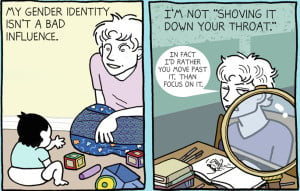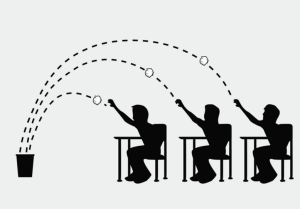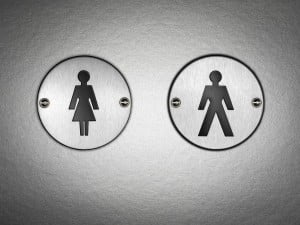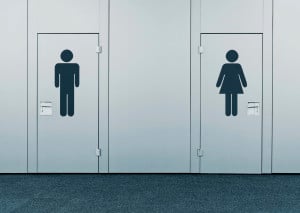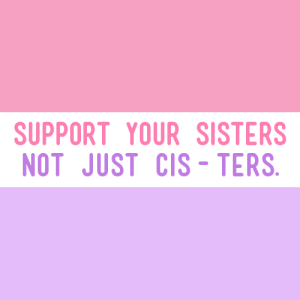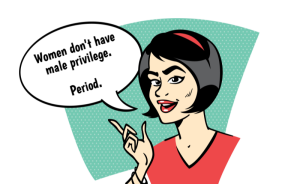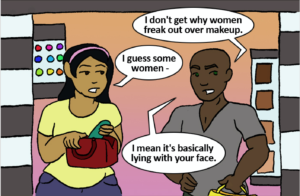
Source: Getty Images
If there’s one thing I learned in my years as a dieter and as a coach, it’s this: Hating yourself doesn’t work – on any level.
You can substitute “hating” for “fighting with,” “tormenting,” “being at war with,” or whatever, but the take-home message is the same. No matter how you say it, being down on yourself doesn’t help you.
It doesn’t create change. If anything, it only creates more stress.
The thing is: We’re all taught to fight our imperfections.
We’re supposed to fight our bodies — changing our shapes, our weights, our wrinkles. We’re supposed to fight our tendencies — to be loud, or rude, or to take the time we need for whatever.
And even if you don’t subscribe to all of the societal “shoulds” that are thrown your way, you may feel a push to hold onto some of them.
Hell, you may even hate your tendency to feel the pressure of all of these “shoulds!”
We grow up learning that this self-hate is normal, that it’s expected, that it’s part of creating change for yourself. It’s how we pressure people into conforming to what we, as a society, deem acceptable. We bully you.
But if you really want to change a habit, or a situation, or how you feel about yourself, the only route that will bring you any peace is to start with acceptance.
From that place, and from that place only, you can actually make a reasoned decision about whether change is even necessary in the first place.
A Real Life Example
Let’s say, for example, that you have a tendency to binge at night. Maybe you stick to a meal plan during the day, or you just feel like you’re able to eat more reasonable amounts during the day, and then at night you feel like you’re bingeing.
How would you handle it if you were fighting with yourself about it?
Perhaps you’d judge yourself, feel guilty for eating what you eat, feel like you need to hide what you’re eating from others.
Maybe you’d get really strict with yourself and force yourself to stop eating as much at night for a few days or a week or two, and then you’d have a particularly stressful day and find yourself overeating again.
Then the guilt and the recriminations are back, and you feel awful. You hate yourself and your lack of willpower and feel stressed out for being out of control.
Sound familiar?
To most people, I’d wager that it does.
But the question to ask yourself is: How does this help me?
Does it at all?
Introducing the “Kindly Researcher”
Let’s consider another way to handle this situation.
I’d like to introduce you to your inner “kindly researcher.”
Your kindly researcher sees your late night bingeing not as a reason to judge you, but as a wonderful source of information.
It accepts what is and just wants to know more.
You can access your kindly researcher at any time.
Use it to ask yourself questions in a kindly way.
It might ask you if you’re eating enough during the day, if your emotions feel more overwhelming at night, if you’re eating past your comfort point because you miss your ex, or feel creatively stymied, or you hate your boss.
As you engage with this concept, you can start to use the stuff you normally fight as a source of information. Not so you can fight it harder, but so that you can, to the best of your ability, start to give yourself what you need.
It will also allow you to start accepting the parts of yourself that you may not be too thrilled with right now. (And if you feel like there’s no way you could accept yourself or your body, check out this recent post.)
Accepting Things About Yourself That You Don’t Like
You may be thinking that it’s dangerous to accept things about yourself that you don’t like.
But on the contrary, I think it’s dangerous not to accept those things.
I can’t think of an instance where someone (a client, a friend, myself) hated something into changing. Not one. Single. Instance.
For years, I hated my tendency to get flustered when I had to do public speaking, even if it was just a meeting at my job. But it was only when I became more self-accepting that I began to give myself a chance to explore some options.
A friend suggested that I try taking an improv comedy class so that I could feel more comfortable speaking off the cuff, and because I was feeling so approving of myself, I was able to do that.
I ended up loving improv comedy so much that I kept taking classes and was asked to be on a musical improv team that performed weekly.
Oh yeah – and I got much less shy about public speaking.
But the amazing thing was that accepting myself and my “flaws” allowed me to have fun doing something that I never thought I could do.
When you accept your perceived flaws, you can actually make some decisions about what you want to change, and whether those flaws are really flaws at all.
Acceptance allows for a fluidity of energy, an appreciation of tiny steps of progress. Hating aspects of yourself just breeds frustration and more hate.
I could give you a bunch of tips here for how to start, but I’d like to just get you started with something simple:
Approve of Yourself for Everything
There are so few things in life that are really do or die.
If you forget your cell phone in your office, gain a few pounds, take a route to work that lands you in bad traffic, wear pants that are more uncomfortable than you thought, forget to wax your upper lip, say the wrong thing in a meeting, or whatever, it rarely has all that much consequence.
And yet, you may find yourself saying to yourself, “I’m such an idiot for doing xyz. Why can’t I do xyz right? What’s wrong with me?”
Instead, say to yourself, “I approve of myself.”
Stop the avalanche of disapproval by thinking or saying it aloud. “I approve of myself.”
Say it or think it at least 100 times a day. (It only takes a few minutes.)
It may feel false at first, or it may feel like a bad idea. You might find yourself thinking, “How can I approve of myself when I always fuck up?”
The question should be, how can you not approve of yourself? What does disapproving of yourself ever get you?
If nothing else, loving your perceived flaws is a worthy experiment.
If you’re reading this post, you’ve probably been trying the other way for a long time. Where has it gotten you so far? Let me know in the comments!
Want to discuss this further? Login to our online forum and start a post! If you’re not already registered as a forum user, please register first here.
Golda Poretsky is a Contributing Writer for Everyday Feminism. She’s a certified holistic health counselor and founder of Body Love Wellness, a program designed for plus-sized women who are fed up with dieting and want support to stop obsessing about food and weight. Follow her on Twitter at @bodylovewellnes. Read her articles here and book her for speaking engagements here.
Search our 3000+ articles!
Read our articles about:
Our online racial justice training
Used by hundreds of universities, non-profits, and businesses.
Click to learn more





